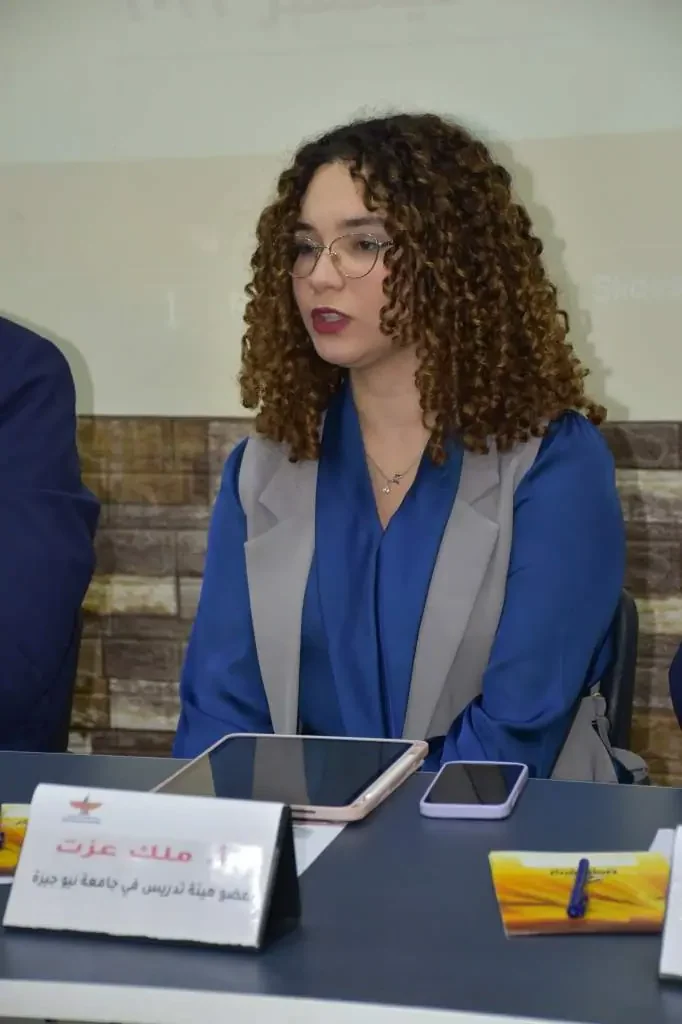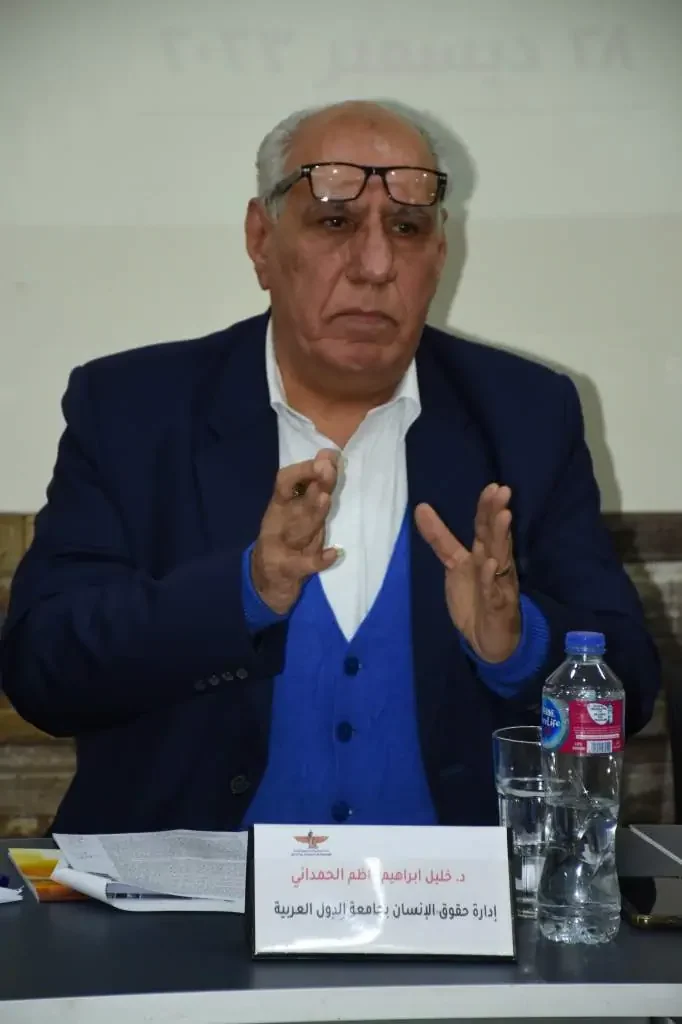Concluding its Campaign: 30 x 50, Human Rights for All
Maat holds a panel discussion on the occasion of the 75th anniversary of Universal Declaration of Human Rights in presence of Palestinian Ambassador in Cairo, representatives of the League of Arab States, and human rights experts In the presence of the Palestinian ambassador in Cairo, representatives of the Arab League and human rights experts
On Thursday, December 28, 2023, Maat for Peace, Development, and Human Rights organized a panel discussion titled "75th Anniversary of Universal Declaration of Human Rights: Progress & Challenges." This event marked the conclusion of the 50x30 Human Rights for All campaign, initiated by Maat on December 10, 2022, and aligned with the 75th anniversary of the Universal Declaration of Human Rights. The discussion centered on the achievements spurred by the Declaration and the persisting challenges it faces. Consisting of 30 articles and a preamble, the Universal Declaration of Human Rights was the focal point of the panel.
Esteemed participants in the discussion included Mr. Ayman Okeil, an international human rights expert and Chairman of Maat; Ambassador Diab Al-Louh, Palestinian Ambassador in Cairo; Counselor Ayman Fouad, a human rights expert; Dr. Khalil Ibrahim Al-Hamdani; Ms. Nada Amin, human rights officer at League of Arab States; Professor Ahmed Bassiouni, an assistant lecturer at Indiana University in the United States; and Professor Malak Ezzat, teaching assistant at Newgiza University. The panel was moderated by Marina Sabry, Director of the International Mechanisms Unit at Maat. Distinguished individuals from academia, media, journalism, and young researchers were also in attendance.
During the panel discussion, speakers underscored the ongoing challenges faced by the Universal Declaration of Human Rights, even 75 years after its adoption. These challenges include the absence of an implementation mechanism, the influence of global powers, and the lack of accountability for violators of the Declaration, such as the Israeli occupation forces and their actions in the Gaza Strip and the West Bank. However, the speakers emphasized the importance of adhering to the principles outlined in the Universal Declaration, as their implementation would contribute to the advancement of human rights.
In this context, Ayman Okeil, international human rights expert and Chairman of Maat highlighted the threat posed by double standards practiced by Western countries, which undermine human rights. He noted that despite the progress made since the adoption of the Universal Declaration, challenges persist, including the absence of a clear implementation mechanism and the proliferation of armed conflicts worldwide, resulting in the deterioration of civilians' human rights. Okeil pointed out that the Human Rights Council in Geneva lacks the authority to enforce compliance and is subject to diplomatic relations between countries, leading to a decline in the implementation of human rights.
Diab Al-Louh, Ambassador of the State of Palestine to the Arab Republic of Egypt, highlighted the ongoing systematic genocidal war carried out by the Israeli occupation forces against the Palestinian people across the Palestinian territories, particularly in the Gaza Strip. This war has resulted in a significant loss of life, with over one hundred thousand Palestinian citizens killed, injured, or missing under the rubble of homes. Shockingly, more than 70% of these victims were women, children, and the elderly. International statistics reveal that approximately 80% of buildings in the Gaza Strip have been destroyed, along with vital infrastructure networks, hospitals, schools, universities, bakeries, medicine and food warehouses, water tanks, mosques, and churches. Al-Louh explained that around 65,000 housing units were completely demolished, 290,000 housing units were partially destroyed, and more than 1.9 million citizens were displaced, enduring homelessness and facing a severe humanitarian crisis due to ongoing aggression and shortages of food, water, and medicine.
The ambassador emphasized that the war against the Palestinian people targets every Palestinian citizen indiscriminately, regardless of political or organizational affiliations. It affects children, women, the elderly, medical personnel, civil defense personnel, journalists, and workers in international organizations, as well as ambulances and healthcare professionals. Al-Louh also highlighted the daily arrests of Palestinian citizens throughout the West Bank, Jerusalem, and the Gaza Strip, with the number of detainees reaching approximately 5,000 since October 2023.
In a similar vein, Counselor Ayman Fouad, an expert in the field of human rights, highlighted the prevalence of double standards and the increasing sophistication of genocidal crimes. He pointed out that Western countries exert significant control over the United Nations system, noting that former Secretary-General Boutros Boutros-Ghali was the only Secretary-General to serve for just one term due to his publication of a report on the Qana massacre committed by the Israeli occupation forces.
Dr. Khalil Ibrahim Al-Hamdani, from the Human Rights Department of the League of Arab States, highlighted that five Arab countries, including Egypt, participated in drafting the Universal Declaration of Human Rights. He emphasized the importance of preserving the document as a set of principles safeguarding human rights. However, he also acknowledged the confusion between human and political rights, which has resulted in the selective use of human rights as a political weapon.
Nada Amin, also from the Human Rights Department of the League of Arab States, emphasized that regional bodies must intensify their efforts to address the challenges posed by the Declaration. These challenges include digital rights, climate change, and health issues. Amin suggested that the League of Arab States could enhance awareness about these challenges by collaborating with international institutions and organizations to promote solutions and provide awareness programs.
Ahmed Bassiouni, an assistant professor at Indiana University in the United States, emphasized that the concept of human rights has been misappropriated by some major countries to justify interference in the internal affairs of other nations. Bassiouni also highlighted how the lack of security poses a significant challenge, which is likely to be exacerbated by climate change. He concluded by stating that the Universal Declaration is an ongoing project that requires steadfast adherence.
Malak Ezzat, a faculty member at Newgiza University, noted that the impact of the Universal Declaration is still limited. However, she highlighted that the document can be utilized to hold countries accountable for violations of the principles it encompasses.
Marina Sabry, Director of the International Mechanisms Unit at Maat, summarized several key recommendations, including not losing hope in international human rights law and striving to adhere to the Universal Declaration of Human Rights; the need for regional bodies like the League of Arab States to play a more prominent role in implementing the Declaration through awareness programs; and the importance of enabling the Palestinian people to establish their independent state based on the 1967 borders, with East Jerusalem as its capital.






























